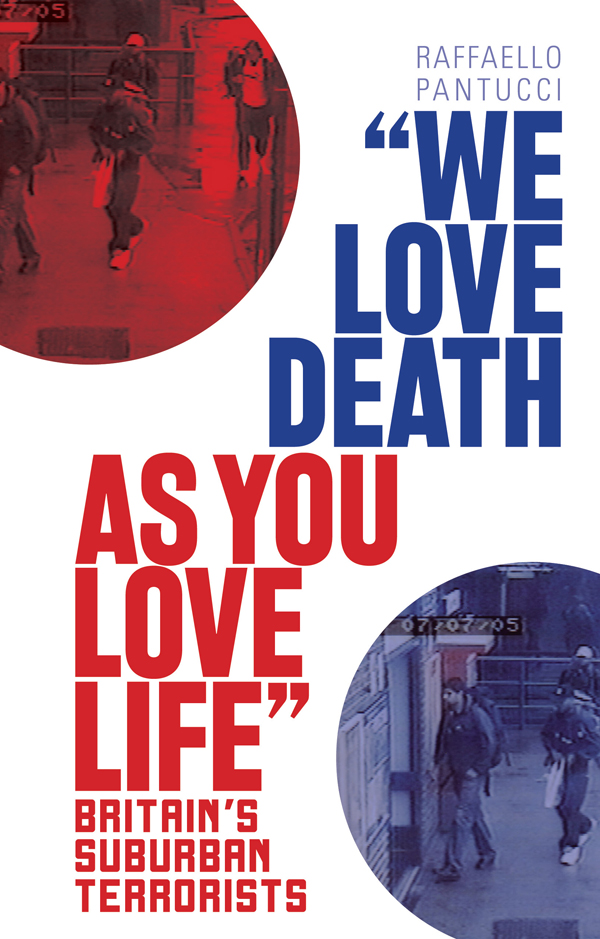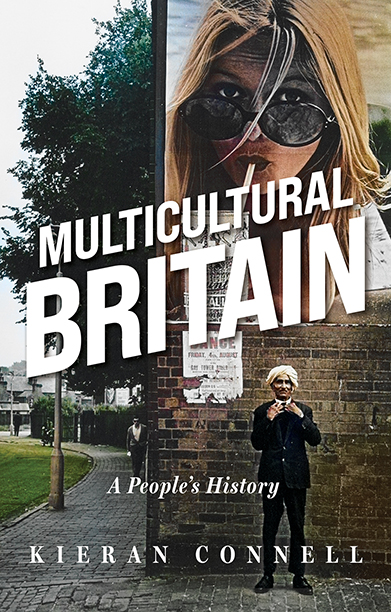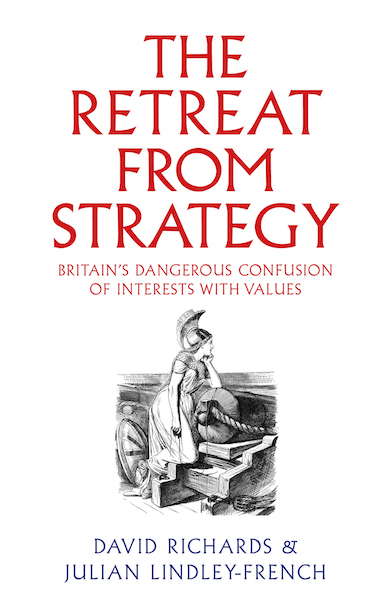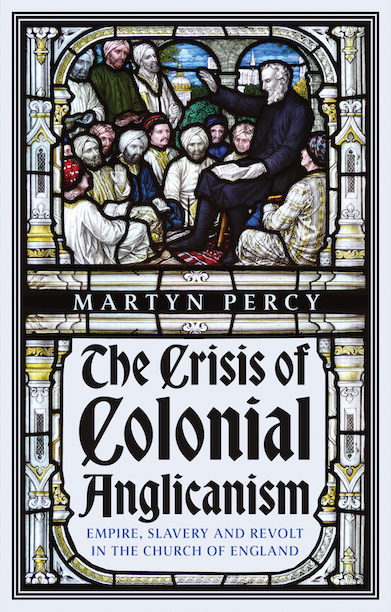‘We Love Death As You Love Life’
Britain's Suburban Terrorists
‘Raffaello Pantucci has written a sober, detailed, and invaluable assessment of Islamist radicalisation in the United Kingdom. Britain may be a multi-cultural society, but not everyone feels part of it. Pantucci throws down the challenge: understand what is happening and act accordingly.’ — Jon Snow, broadcast journalist, Channel 4 News
Description
As Mohammed Siddique Khan led his group of fellow believers into London on the morning of 7 July 2005 it is unlikely that they were thinking much beyond the immediate impact of their actions. Driven by anger at the West’s treatment of Muslims worldwide, ideas fed to them by foreign extremists, and a rejection of the society in which they were born, they sought to reshape the world in an image they thought would be pleasing to God. But while they felt they were on a holy mission — as enunciated in Khan’s chilling video message, ‘We Love Death As You Love Life’ — a far more earthly arc of history underlay their actions.
This book offers an insight into the motivations behind Khan and his group, as well as the hundreds of young British Muslims who have been drawn by jihadist ideas to fight on battlefields at home and abroad. From the arrival of immigrant communities to the UK and the establishment of diasporas with strong ethnic connections to the Middle East and South Asia, to the arrival of jihadist warriors fresh from the anti-Soviet war in Afghanistan, Pantucci looks at the history that came before Mohammed Siddique Khan and places his action within its larger context. This book provides the first comprehensive history of jihadist ideas and violence in the United Kingdom.
Table of contents
Acknowledgements
Introduction: Jihad UK
1. From Arabia to South Asia: Migration
– South Asian Migration
– Chain Migration
– Arab Migration
– Arab Terrorism Comes to the UK
– South Asian Politics and Islam Come to the UK
– Kashmir
– Jihad Comes to London
2. Alienation and the Suburban Mujahedeen
– Bradford
– Beyond Bradford
– Building Their Own Structures
– Orphans of Islam
3. Early Expressions: From the Rushdie Affair to Jihad in Bosnia
– The Rushdie Affair
– The Muslim Parliament
– Hizb ut-Tahrir and Omar Bakri Mohammed
– Bosnia
– The Impact of Bosnia
– Abu Hamza al-Masri and Supporters of Shariah
– Fin de siècle
– Molten Lava
4. 9/11 and the Londonistan Links
– Training
– Abu Qatada
– Abdullah el-Faisal
– The wit and wisdom of Abdullah el-Faisal
– Shoe Bomber
– Finsbury Park
– The Algerian Connection
– Afghanistan
– Iraq
5. 7/7 and the Near Misses
– Operation Crevice
– Tel Aviv bombers
– Operation Rhyme
– Azzam.com
– 7 July 2005
– Fellow Travellers
– The East London connection
– Finsbury Park and 21 July 2005
– Operation Overt
– The crest of the first wave of British jihad
6. The Next Generation of British Jihad
– Iraq Comes Home
– AfPak persists
– Somalia
– Internet
– Lone Wolves
7. Conclusions
– Anwar al Awlaki
– Today
Reviews
‘Raffaello Pantucci has written a sober, detailed, and invaluable assessment of Islamist radicalisation in the United Kingdom. Britain may be a multi-cultural society, but not everyone feels part of it. Pantucci throws down the challenge: understand what is happening and act accordingly.’ — Jon Snow, broadcast journalist, Channel 4 News
‘Pantucci has produced a useful chronicle of every terror plot down to and beyond the London 7/7 bombings … a well-written book, he has gone through the details of so many court transcripts and a mountain of press cuttings to establish the depth and scale of our problems.’ — The Evening Standard
‘The most articulate and carefully researched account of Britain’s “suburban terrorists” to date. … [Pantucci] covers a sweeping, underexplored arc of British cultural history, from early waves of migration from the 1950s to 1970s to the flourishing of extremist movements across the UK and the terrorist cells they have spawned. Every significant terror plot of the past two decades is covered. … We Love Death could not be more timely’ — Financial Times
‘Pantucci’s description of the jihadi plots that have been hatched in the UK concentrates on the question of what causes radicalisation in the first place. With the usual caveat that no single explanation seems adequate, he offers the analogy of a fruit machine. A jihadist recruiter looking for a new volunteer hits the jackpot when three drivers — ideology, grievance and mobilisation — all come together at the same time.’ — Owen Bennett-Jones, London Review of Books
‘sober, informative and nuanced’ — Prospect
‘Interesting and accessible enough to keep the attention of the general reader, this book will help an international audience understand the story of UK Islamist terrorism and will provide experts with sound analysis and the chance to read for the first time the full story in one volume. Pantucci avoids the tendency of more politically biased commentators to blame the terrorists’ radicalisation on either British foreign policy, poverty and islamophobia or radical foreign preachers, “an evil ideology” and multiculturalism. Instead, through in-depth research into the personalities involved in the UK terrorist plots, the author shows that no single one of these explanations is sufficient but that all have played a role in motivating some of Britain’s suburban mujahedeen.’ — Innes Bowen, BBC; author of Medina in Birmingham, Najaf in Brent: Inside British Islam
‘Raffaello Pantucci carefully details how over several decades Britain came to develop its own mini-jihad. He gives a vivid and at times shocking description of the formative experiences of Britain’s self-appointed Muslim warriors. Essential reading for anyone who wants to understand how religious, political, social and broader cultural narratives combined to end in murder on the streets of Britain.’ — Professor Sir David Omand, King’s College London and former UK Security and Intelligence Coordinator
‘A compelling narrative of the origins and evolution of violent Islamism in the United Kingdom, its precipitants — ideology, grievance and mobilisation — and ever expanding geographical reach. Its lively pen portraits of the main perpetrators amounts to an indispensable A to Z of the individuals, groups and organisations involved. Essential reading for policy maker, specialist and citizen alike — Muslim and non-Muslim.’ — Philip Lewis, Inter-Faith Adviser to the Bishop of Bradford and author of Young, British and Muslim
‘This book will be one of the definitive texts on the study of radicalisation for years come — well researched, articulate, and rich in understanding. We Love Death as You Love Life provides the kind of detailed, rich analysis which is important for students, policy makers and any one with an interest in how radicalisation in Britain actually works.’ — Jonathan Githens-Mazer, Associate Professor in Ethnic-Politics, University of Exeter
‘Pantucci’s detailed narrative does make for fascinating reading. … He tells the long story [of British extremists] without any personal judgement, “eschewing the polemical approach often favoured in the discussion of terrorism.” … the author warns that we are now facing a new threat, with hundreds of Britons in Syria, Libya, Somalia and the rise of the self-styled Islamic State.’ — International Affairs
‘this is a very good book. It provides an alternative reading of European integration, aiming to explain a phenomenon hitherto only poorly accounted for. It does so in a theoretically cogent and empirically rich way.’ — Anand Menon, Professor of European Politics and Foreign Affairs, King’s College London
Author(s)
Raffaello Pantucci is Director, International Security Studies, Royal United Services Institute for Defence and Security Studies (RUSI). He has worked on questions around terrorism and radicalisation in London and Washington, and has been published widely in both the media and the academic and specialist press. This is his first book.






